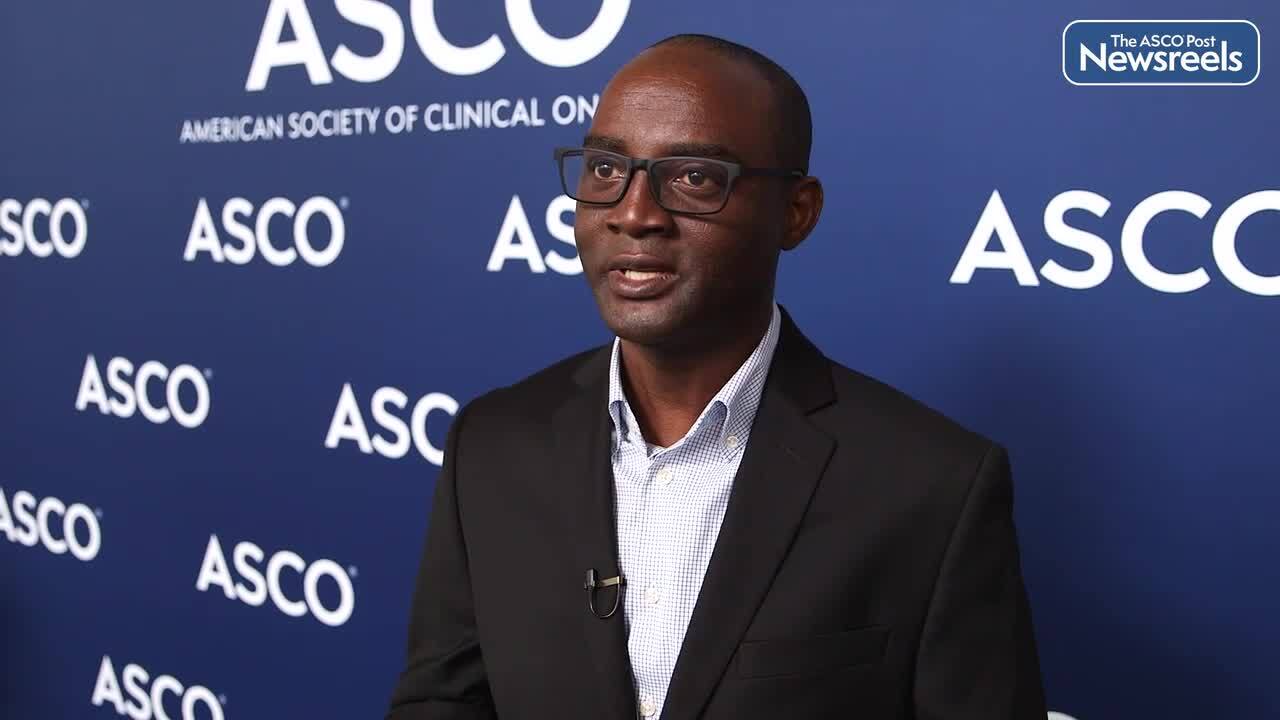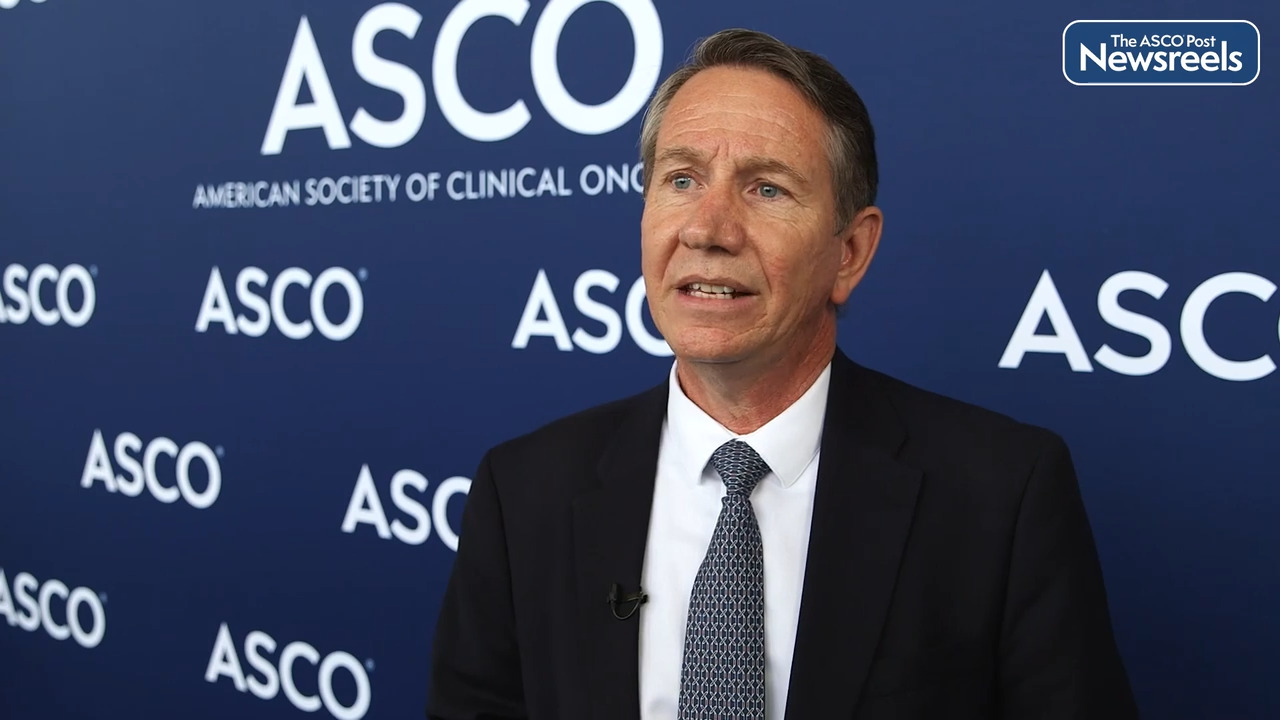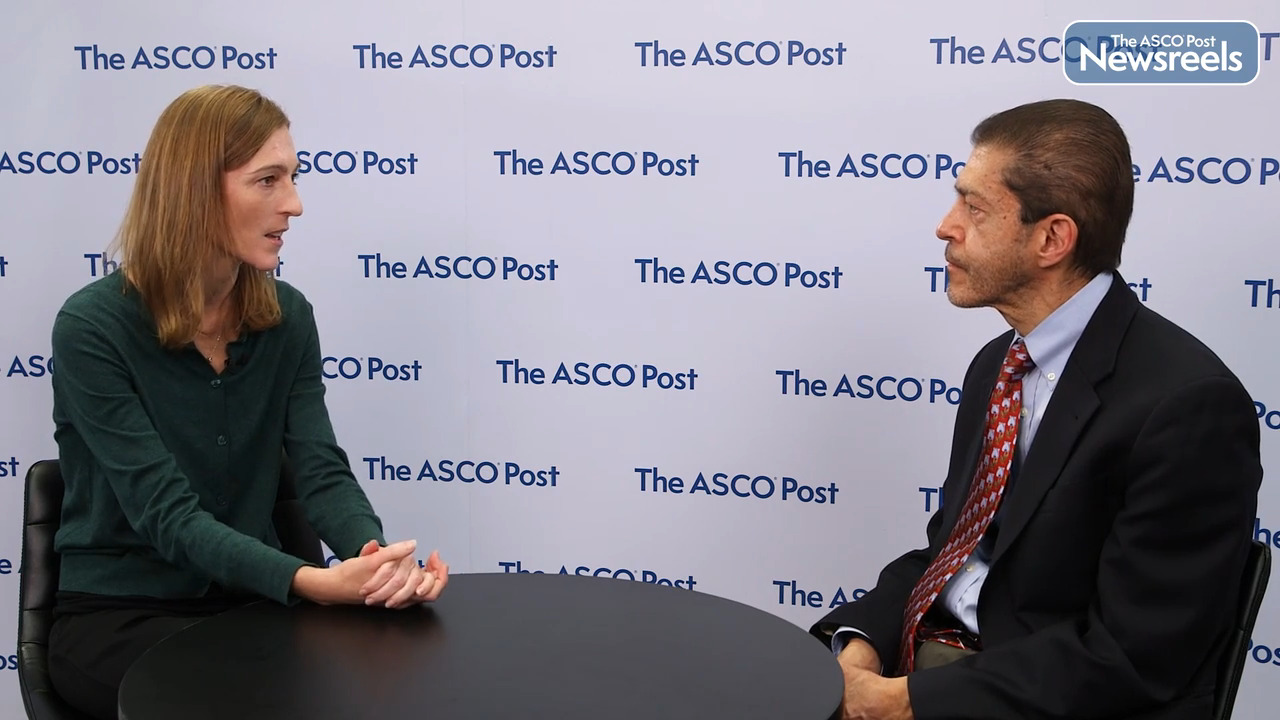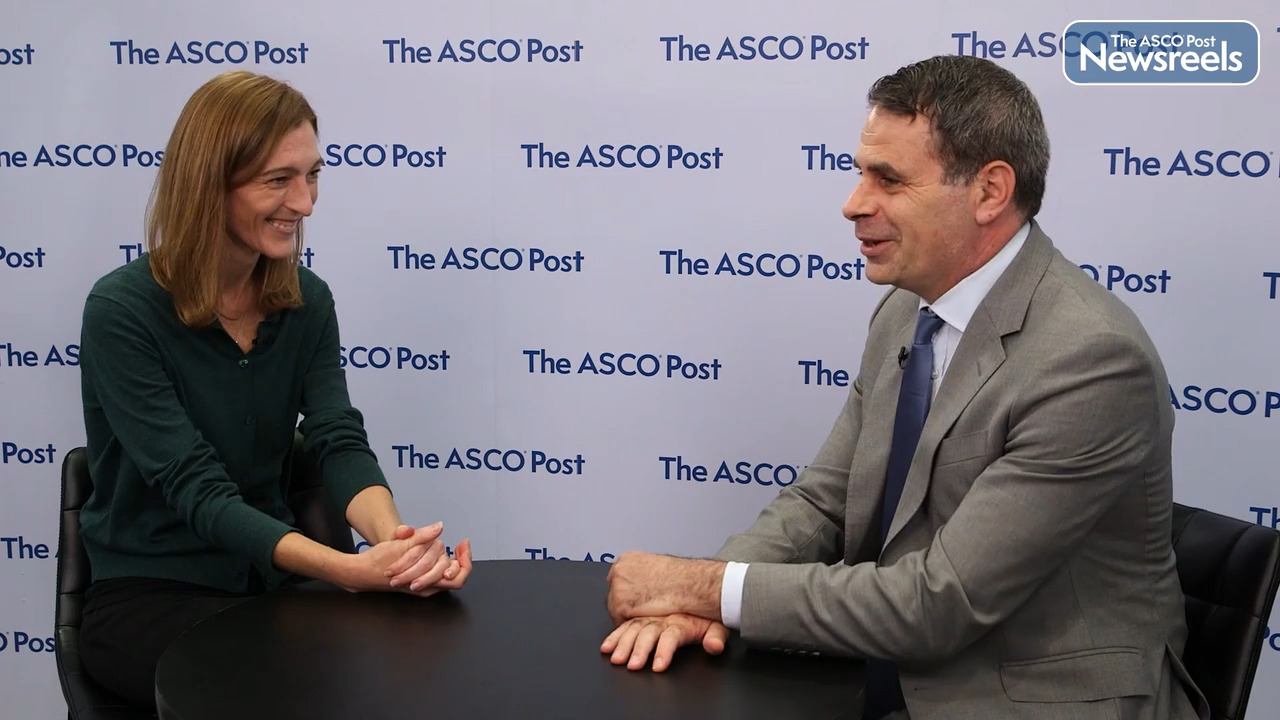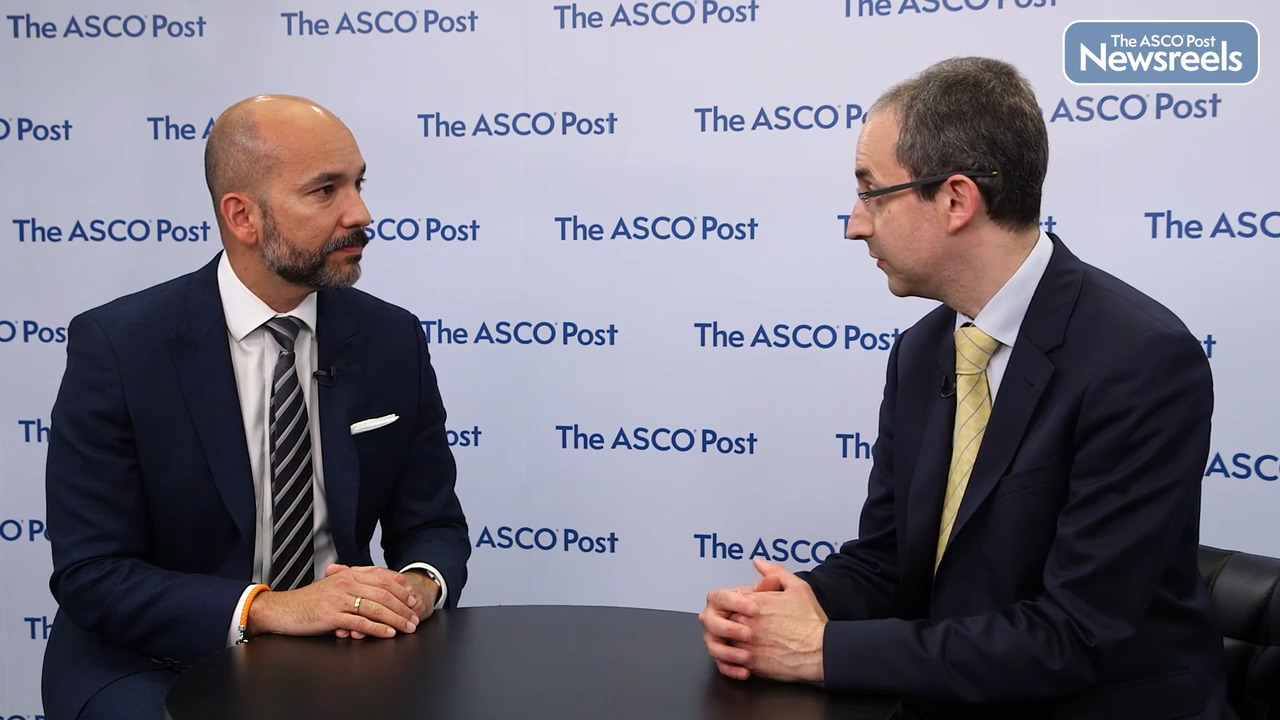Rainer Fietkau, MD, on Pancreatic Cancer: Initial Trial Results on Sequential Chemotherapy and Chemoradiotherapy
2022 ASCO Annual Meeting
Rainer Fietkau, MD, of Germany’s University Hospital Erlangen, discusses phase III findings of the CONKO-007 trial, which examined the role of sequential chemotherapy and chemoradiotherapy administered to patients with nonresectable locally advanced pancreatic cancer following standard-of-care chemotherapy (Abstract 4008).
Transcript
Disclaimer: This video transcript has not been proofread or edited and may contain errors.
So CONKO-007 study compared in a randomized Phase III trial the effect of chemoradiotherapy or chemotherapy following induction chemotherapy. We included the patients with nonresectable locally advanced pancreatic cancer. Following three months of induction therapy, restaging was performed and patients with new detected metastasis or insufficient dosage of chemotherapy were included. 525 patients were included. 366 patients were randomized.
Important, we had the following feature of the study. Nonresectability was confirmed a panel of five experienced surgeons. This was checked again following the whole therapy and surgery was recommended if an R0 resection seems to be possible. And, we succeeded, that in both arms about 36% of the patients were then treated with surgery. We think that this high number was due to the fact that surgery was often recommended in the second surgical evaluation.
The primary end point, the R0 resection, was evaluated in the 122 patients with resection. Following chemoradiotherapy, more R0 resections were possible. The rate of R1 resections was significantly lower. The OS rate of CRM negative tumor was significantly higher. Furthermore, we found significantly more complete remissions following chemoradiotherapy.
In a second analysis, for all randomized patients nearly all statistically different parameters remained significant. Complete remission rate, R1 resection rate, CRM positive or negative status, all in favor of chemoradiotherapy. Only the R0 resection rate was no more statistically different, but this did not translate into a better overall progression free survival or overall survival. But what is very important, is the effect of additional surgery. None of the patients without surgery survived five years, but 17.5% with additional surgery. Of course, these are no randomized data and are biased by patient selection, but it may show the important role of surgery of these patients.
Moreover, the best survival data we achieved for CRM or R0 resected patients was a five year survival rate of 35 to 27%. We found some hints that chemoradiotherapy improves this long term survival of surgically treated patients. Five year survival following chemoradiotherapy is 24% compared to 20% following chemotherapy alone. Of course, these results are not statistically different but may be a hint how the better R0 resection rate may potentially translate into a better survival.
In conclusion, we found that additional chemoradiotherapy to chemotherapy improves significantly the R0 resected rate, in surgically treated group but not in all randomized patients. Additional chemoradiotherapy improves the rate of R0 CRM negative resected significantly and very importantly, 36% of all randomized patients can be treated additionally with surgery, the five year survival of 17.5% compared to 0% without surgery. Overall this concept of induction chemotherapy, additional chemoradiotherapy and surgery, is visible, with a five year survival rate of 9.6% and selects a favorable subgroup of patients that has an impressive long term survival rate of up to 26%.
And the next steps in our analysis will be a further evaluation of prognostic parameters to select better patients who will benefit most from surgery and chemoradiotherapy.
Related Videos
The ASCO Post Staff
Maxwell Oluwole Akanbi, MD, PhD, of McLaren Regional Medical Center, discusses the study he conducted, using the SEER database, to evaluate the impact of lung cancer screening recommendations on low-dose CT scanning. The data suggest that guidelines from the U.S. Preventive Services Task Force led to a more rapid decline in the incidence of advanced disease in the United States, especially among minority populations (Abstract 10506).
The ASCO Post Staff
Stephen M. Ansell, PhD, MD, of Mayo Clinic, discusses updated data from the ECHELON-1 trial, which showed that, when administered to patients with stage III or IV classical Hodgkin lymphoma, the combination of brentuximab vedotin, doxorubicin, vinblastine, and dacarbazine (A+AVD) vs doxorubicin, bleomycin, vinblastine, and dacarbazine resulted in a 41% reduction in the risk of death. These outcomes, says Dr. Ansell, confirm A+AVD as a preferred option for previously untreated disease (Abstract 7503).
The ASCO Post Staff
Courtney D. DiNardo, MD, MSCE, of The University of Texas MD Anderson Cancer Center, and Jorge E. Cortes, MD, of Georgia Cancer Center at Augusta University, discuss phase III results from the ASCEMBL trial, which showed that after more than 2 years of follow-up, asciminib continued to yield superior efficacy and better safety and tolerability vs bosutinib in patients with chronic myeloid leukemia (CML) in chronic phase. These results continue to support the use of this kinase inhibitor as a new CML therapy, says Dr. Cortes, with the potential to transform the standard of care (Abstract 7004).
The ASCO Post Staff
Courtney D. DiNardo, MD, MSCE, of The University of Texas MD Anderson Cancer Center, and Stéphane de Botton, MD, PhD, of Institut Gustave Roussy, discuss phase III findings from the IDHENTIFY trial, which showed that mutational burden and co-mutational profiles differed between patients with relapsed or refractory acute myeloid leukemia that exhibited IDH2-R140 and IDH2-R172 mutations. Enasidenib improved survival outcomes for patients with IDH2-R172 mutations: median overall survival and 1-year survival rates were approximately double those in the conventional care arm (Abstract 7005).
The ASCO Post Staff
Gilberto de Lima Lopes, Jr, MD, MBA, of the Sylvester Comprehensive Cancer Center at the University of Miami, and Matthew Krebs, PhD, of The University of Manchester and The Christie NHS Foundation Trust, discuss results from the CHRYSALIS study. The trial showed that the bispecific antibody amivantamab-vmjw demonstrated antitumor activity, even after prior treatment, in patients with non–small cell lung cancer that exhibits the MET exon 14 skipping mutation (Abstract 9008).
